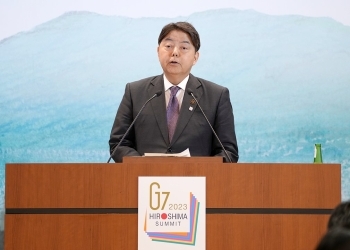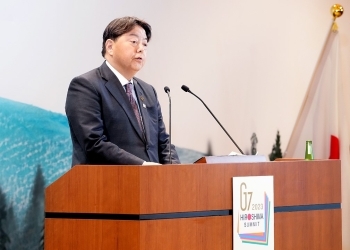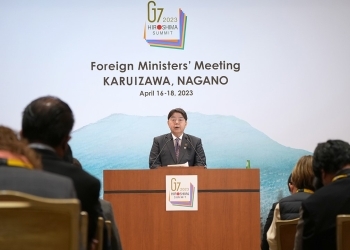G7
G7 Foreign Ministers’ Meeting in Karuizawa, Nagano
(Presidency Press Conference)
Tuesday, April 18, 2023, 11:45 a.m. Karuizawa



1. Opening remarks
Mr. HAYASHI Yoshimasa, Minister for Foreign Affairs: For three days starting from April 16, the G7 Foreign Ministers’ Meeting in Karuizawa, Nagano was held here. While the international community is at a historic turning point, I am very pleased to hold candid and in-depth discussions with the other G7 Foreign Ministers in Karuizawa, a place blessed with abundant nature, and to issue the G7 Foreign Ministers’ Communiqué as an outcome of the meeting.
I would like to express my gratitude to the G7 Foreign Ministers for their participation and all of those who involved with the meeting. As Chair, I would like to briefly present the outcomes of the Foreign Ministers’ Meeting.
Overview
It is the second time that in-person G7 Foreign Ministers’ Meeting was held this year, and throughout the sessions, the G7 Foreign Ministers confirmed our coordination leading up to the G7 Hiroshima Summit in May. Furthermore, considering that this year’s summit will be held in Hiroshima, we discussed nuclear disarmament and non-proliferation in detail.
Furthermore, the G7 confirmed in writing, for the first time, its commitment to the “free and open international order based on the rule of law,” which Japan emphasizes, and that it strongly opposes any unilateral attempts to change the status quo “anywhere in the world.”
Indo-Pacific
As the only G7 member from Asia, Japan considers it important for the G7 members to thoroughly exchange views on the Indo-Pacific region. At this G7 Foreign Ministers’ Meeting, ample time was allotted for discussion of the Indo-Pacific during the working dinner on the first day and the first session on the second day. During the discussion, I explained Japan’s views on a “Free and Open Indo-Pacific” (FOIP) and the New Plan for a FOIP and confirmed the G7 members’ support. In addition, the G7 members reaffirmed our enhanced engagement with the Indo-Pacific region, our unwavering support for ASEAN centrality and unity, and our commitment to promoting cooperation in line with the ASEAN Outlook on the Indo-Pacific, as well as our partnership with Pacific Island countries. Additionally, the G7 Foreign Ministers shared the view that, as part of the G7 framework, we will regularize discussions and strengthen cooperation in relation to the Indo-Pacific.
China
With regard to China, the G7 Foreign Ministers confirmed the importance of engaging in candid dialogue with and expressing our concerns directly to China, as well as the need to work together with China on global challenges as well as areas of common interest. The G7 Foreign Ministers called on China to act as a responsible member of the international community and confirmed that we stand prepared to build constructive and stable relations with China through dialogue. Furthermore, the G7 Foreign Ministers stated that we remain seriously concerned about the situation in the East and South China Seas, and concurred to strongly oppose any unilateral attempts to change the status quo by force or coercion. We also reaffirmed the importance of peace and stability across the Taiwan Strait as an indispensable element in security and prosperity in the international community.
Russia and Ukraine
Regarding the situation in Ukraine, the G7 Foreign Ministers confirmed that we remain united to continue severe sanctions against Russia and strong support for Ukraine. We underscored that Russia must withdraw all forces and equipment from Ukraine immediately and unconditionally. In addition, we confirmed that Russia’s irresponsible nuclear rhetoric and its threat to deploy nuclear weapons in Belarus are unacceptable. Furthermore, we concurred in reinforcing coordination to prevent and respond to evasion of sanctions as well as third-party weapon supply to Russia.
Disarmament and Non-Proliferation
Regarding disarmament and nuclear non-proliferation, we just devoted a session to discussing this issue in detail. Unfortunately, the situation surrounding nuclear disarmament has become even more severe. Nevertheless, the G7 Foreign Ministers reaffirmed our continued commitment to a world without nuclear weapons. We shared the view that it is essential to maintain and strengthen the NPT regime and to further promote nuclear disarmament under this regime. Last year, Prime Minister Kishida proposed the “Hiroshima Action Plan” as the first step of a realistic roadmap, which would take us from the “reality” we face in the harsh security environment to the “ideal” of a world without nuclear weapons. This plan was received by the G7 members as a welcome contribution to the realization of a world without nuclear weapons. As for concrete efforts toward nuclear disarmament, the G7 Foreign Ministers underlined the importance of the Comprehensive Nuclear-Test-Ban Treaty (CTBT) and a treaty banning the production of fissile material for nuclear weapons or other nuclear explosive devices (FMCT), as well as shared concerns over China’s expansion of its nuclear arsenal and confirmed the importance of transparency around such developments. Furthermore, we urged China to engage promptly in strategic risk reduction discussions with the U.S. and called on nuclear-weapon States that have not declared and maintained moratoria on the production of fissile material to do so.
Economic Security
An independent paragraph on economic security was included in the G7 Foreign Ministers’ Communiqué for the first time. In this paragraph, we expressed our concern that threats to economic security are increasing. We shared the view to advance concrete initiatives, such as building resilient supply chains based on trustworthiness and reliability, countering economic coercion in coordination among diplomatic authorities, and taking measures against illegitimate or forced state-led attempts to acquire our critical technologies and intellectual property.
“Global South” and Other Matters
In addition, we reaffirmed the importance of enhancing our engagement with the so-called “Global South” and concurred to strengthen related cooperation among the G7. We also shared the view to enhance cooperation with countries in the Middle East, Central Asia, Africa, and Latin America and the Caribbean.
Furthermore, regarding the situation in Sudan, the G7 Foreign Ministers strongly condemned the ongoing fighting and called for an immediate end to hostilities. We also affirmed to cooperate closely, including on protecting our respective citizens.
Concluding Remarks
As the Chair, I am very pleased that we were able to hold such fruitful discussions among the G7 Foreign Ministers. The cooperation among G7 Foreign Ministers is closer than ever. We will continue to work together to address the urgent challenges facing the international community leading up to the G7 Hiroshima Summit.
In concluding my opening remarks, I would like to express my deepest gratitude to everyone in Karuizawa Machi and Nagano Prefecture for warmly welcoming the G7 Foreign Ministers with their wonderful hospitality.
[Reference]Opening Remarks(French(PDF) / Spanish(PDF)
/ Spanish(PDF) / Simplified Chinese(PDF)
/ Simplified Chinese(PDF) / Traditional Chinese(PDF)
/ Traditional Chinese(PDF) / Arabic(PDF)
/ Arabic(PDF) / Russian(PDF)
/ Russian(PDF) )
)
2. Q&A
Mainichi Shimbun, Takeuchi: I have a question about the outcomes of this meeting. As you represent the only Asian G7 member, did you get any indication that the sense of crisis around the East Asian security environment, where China is increasing its military and economic influence, was shared by the geographically distant countries of Europe? Also, I believe nuclear disarmament and the elimination of nuclear weapons will be an important topic at the Hiroshima Summit in May. Do you think this Foreign Ministers’ Meeting produced any fruitful discussions on nuclear disarmament and the elimination of nuclear weapons, such as on the response to China’s rapid build-up of its nuclear arsenal? Furthermore, people in Hiroshima and Nagasaki, which suffered atomic bombings, have repeatedly called for the Government to create opportunities coinciding with the Hiroshima Summit for the G7 leaders to hear directly from the atomic bomb survivors and to learn the reality of the atomic bombings. Does the Government intend to create opportunities for such dialogue?
Minister Hayashi: Regarding your first question, Russia’s aggression against Ukraine is an outrageous act that shakes the very foundation of the international order and is absolutely unacceptable. The security of Europe and the Indo-Pacific is indivisible, and I hold the sense of crisis that Ukraine today may be East Asia tomorrow.
Turning one’s eyes to the Indo-Pacific region, there continue to be unilateral attempts to change the status quo by force in the East and South China Seas and military activities around Japan are becoming more active. Furthermore, North Korea is escalating its actions, including launching ballistic missiles with an unprecedented frequency and in unprecedented manners. Russia continues to actively engage in military activities in its Far East region, in addition to which China and Russia are strengthening their military cooperation.
At the G7 Foreign Ministers’ Meeting in Karuizawa, Nagano, the G7 Foreign Ministers held in-depth discussions, including on such an East Asian security environment. Furthermore, for the first time, the G7 confirmed its commitment to the “free and open international order based on the rule of law” and its strong opposition to unilateral attempts to change the status quo “anywhere in the world,” which I consider to be a significant outcome.
In addition, at the meeting, the G7 Foreign Ministers shared the view to regularize discussions in relation to the Indo-Pacific as part of the G7 framework. Based on such outcomes, Japan intends to continue to strengthen G7 cooperation, including with the Hiroshima Summit in mind.
Regarding your second question on disarmament and non-proliferation, at the meeting, we reaffirmed our commitment, as the G7, to a world without nuclear weapons, cognizant also of the holding of the G7 Summit in Hiroshima. Based on that, G7 Foreign Ministers exchanged views on concrete and practical initiatives for advancing nuclear disarmament, and the “Hiroshima Action Plan” proposed by Prime Minister Kishida last year was received by the G7 Foreign Ministers as a welcome contribution to realize a world without nuclear weapons.
In addition, the G7 Foreign Ministers shared concerns over China’s expansion of its nuclear arsenal and confirmed the importance of transparency around such developments. Moreover, we urged China to engage promptly in strategic risk reduction discussions with the U.S.
As for your third question, at the G7 Hiroshima Summit, while building on discussions at this G7 Foreign Ministers’ Meeting, Japan intends to strongly convey to the world the message that the 77 years of history since the atomic bombings of Hiroshima and Nagasaki, during which time no nuclear weapons have been used, must not be ignored.
Furthermore, it is important to firmly convey the reality of the atomic bombings to the world as the start of all efforts toward nuclear disarmament. As for the itinerary of the Hiroshima Summit, we will carefully consider how to make it as meaningful as possible.
Reuters, Murakami: Given China has been ramping up its military pressure on Taiwan, how should the G7 deter such coercive behavior? Should deterrence fail, do you think coordinated action against China should be spearheaded by the G7 countries? Also, could you please talk a little bit about what specific discussions the G7 Foreign Ministers had about the possibility of a Taiwan contingency?
Minister Hayashi: Peace and stability across the Taiwan Strait is indispensable to security in Japan as well as to the security and prosperity of the entire international community. We expect that the issue surrounding Taiwan will be resolved peacefully by dialogue. This has been the consistent position of the Government of Japan.
At the G7 Foreign Ministers’ Meeting, we confirmed the importance of peace and stability across the Taiwan Strait as an indispensable element in security and prosperity in the international community, and called for the peaceful resolution of cross-Strait issues.
I would like to refrain from answering questions based on a hypothetical Taiwan contingency. In any case, the Government will directly convey to China the importance of peace and stability across the Taiwan Strait. We have been working closely with the international community, including the G7, in sending out clear messages in this regard. We intend to continue these diplomatic efforts.
Shinano Mainichi Shimbun, Yazawa: Minister, I understand that you celebrated the birthdays of Minister Colonna and Secretary Blinken with an apple pie from the Mampei Hotel in Karuizawa, which John Lennon frequently visited. Karuizawa has been favored by many people, including politicians, cultural figures, and John Lennon. Did the holding of the Foreign Ministers’ Meeting in Karuizawa have any influence on the discussion or the joint statement? Please share any anecdotes or your impressions from the meeting. I would also like to ask one more question. Beforehand, I heard that you planned to play the piano at the meeting. Did you in fact do so? If so, what did you play?
Minister Hayashi: As you mentioned, since April 16 marked the birthdays of the Honorable Antony Blinken, Secretary of State of the United States of America, and H.E. Ms. Catherine Colonna, Minister for Europe and Foreign Affairs of the French Republic, we celebrated their birthdays by offering an apple pie specially prepared by the Mampei Hotel, a favorite of John Lennon, who frequently visited Karuizawa, at the end of the working dinner. I am not sure what kind of influence (eikyo in Japanese) there might have been, but there was certainly a lot of nourishment (eiyo in Japanese).
As the only ones at the venue in Karuizawa, which is surrounded by abundant nature, we were able to further deepen not only our personal relationships of trust among foreign ministers, but also, through candid discussions, our relationship of trust as a G7 “team.”
As for piano performance, there was no such opportunity as there was no piano.
AFP, Hussein: G7 countries have offered Ukraine aid, diplomatic and military support and imposed sanctions against Russia, but the war drags on. Today’s communiqué does not include any new measures like sanctions. Does that reflect the difficulty in finding additional ways to influence the conflict, and, realistically, what more can the G7 do to bring this war to an end?
Minister Hayashi: Russia is continuing its aggression against Ukraine in violation of international law. Furthermore, President Putin has shown no willingness to engage in serious and sincere dialogue, stating that the annexed parts of Ukraine are not up for negotiation. That is the situation.
Regrettably, the aggression has prolonged. To bring it to an end as quickly as possible, Russia must immediately withdraw from Ukraine and end its aggression, as stated in the successive United Nations General Assembly resolutions supported by more than 140 countries. I believe that, to ensure that Russia responds to the calls of the international community, it is important to support Ukraine defending itself against this illegal aggression and implement sanctions against Russia.
At the G7 Foreign Ministers’ Meeting in Karuizawa, Nagano, the G7 Foreign Ministers confirmed that we remain committed to continue severe sanctions against Russia and strong support for Ukraine. In addition, we confirmed that we will make even greater calls to the entire international community, including countries known as the “Global South,” to jointly recognize the need to comply with principles that form the very foundation of the international order, such as respect for sovereignty and territorial integrity.
As this year’s G7 Presidency, Japan will continue to actively lead international discussions, with the G7 Hiroshima Summit also in mind.

